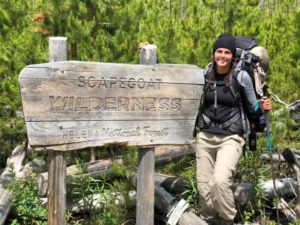 No one wants to carry around an encyclopedia in their 75 liter pack through the Scapegoat Wilderness. Even if I did want to carry around my phone, there is no service for Siri to look up definitions for me. Therefore I am challenged to create my own definition of “Wilderness.” With assistance of my WRFI reader, I have carefully crafted my own personal definition that I can only hope meets the standards of my naturalist predecessors.
No one wants to carry around an encyclopedia in their 75 liter pack through the Scapegoat Wilderness. Even if I did want to carry around my phone, there is no service for Siri to look up definitions for me. Therefore I am challenged to create my own definition of “Wilderness.” With assistance of my WRFI reader, I have carefully crafted my own personal definition that I can only hope meets the standards of my naturalist predecessors.
Bob Marshall in his 1930 essay “The Problem of Wilderness” spoke of wilderness as “a region which contains no permanent inhabitants, possesses no possibility of convergence by mechanical means, and is sufficiently spacious that a person in crossing it must have the experience of sleeping out.” Over the past week, I have been honored to backpack through the Helena National Forest and Scapegoat Wilderness, part of a series of interconnected wilderness areas named after Bob Marshall himself. He was a pioneer, with inspiring insight and thoughts about the American landscape beyond his time.
A more recent thinker who also tackles ideas about wilderness is the writer Christopher Ketcham. In his recent article in Orion Magazine, called “Taming the Wilderness,” he writes: “Wilderness is intended, among its other purposes, to be a refuge for wild animals and plants, where the processes of evolution, so far as we humans have observed them, are to remain unmolested and unhampered.” Ketcham also defines wilderness as “difficult to reach and explore, sometimes dangerous to life and limb.” Through his writings, Ketcham inspires me to expand my own definition of the natural world and of wilderness. We must acknowledge that we have not been “humble or responsible.” This realization has led me to a passion for stepping up and advocating for the stewarding of our public lands and wilderness.
In addition to Marshall and Ketcham, other naturalist writers have contributed to my personal definition of wilderness, including Thomas Lowe Fleischner and the novelist Wallace Stegner. These two authors had powerful remarks about loving the natural world we are surrounded by, and fighting for what is left of it. Both encourage acceptance of what is, but also of what can be. While they don’t deny that there are serious environmental problems, they both encourage us to strive beyond the status quo. They both want us to better the wilderness in every possible way. Thomas Lowe Fleischner states “a known and loved world has more effective advocates than one that is ignored.” Wallace Stegner writes, “Better a wounded wilderness than none at all.” These wise words have provoked in me my own, unique definition of wilderness.
Now with you I share my vision of Wilderness:
Wilderness: A home to plants and animals that did not earn our respect, but simply deserve our respect through their existence. A natural area that allows humans to escape, find solitude, and practice mindfulness. A home and refuge that must be protected and fought for by the naturalists and passionate advocates, few in number, but strong in heart.
My definition of Wilderness draws on perspectives from both science and philosophy. To me, my definition is pure, honest, and valuable. The opportunity to temporarily live in a Wilderness, as I am right now, forces me to practice being a steward of this earth. It forces us, as humans, to open our eyes to how small we are in the scheme of all beings. These vast landscapes allow me to dream bigger, reach higher, and advocate for the land that sustains us.
Although my journey to find and perfect the definition of Wilderness is just beginning, I hope and dream that with every passing night, I find more of myself among these lands; I want my dreams to soar, just as the towering Lodgepole Pines reach for the sky. They are my guides. For now I thank the Wilderness for humbling me, empowering me, and allowing me to let my light shine.